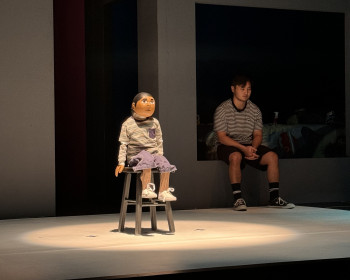Theatre production explores familiar play in a fresh way
Though Romeo and Juliet is one of the most famous plays ever written, Associate Professor of Theatre Stepan Simek is hoping to shed new light on the classic story in the fall main stage production at Lewis & Clark.
The contemporary retelling will explore the societal ills that lead to the protagonists’ untimely demise, emphasizing how relevant Shakespeare’s drama continues to be.
Opening October 29, the production will feature a cast of 24 actors, all students except for Associate Professor Jerry Harp, who plays the Friar. A live band will accompany the performances, which take place on a minimal set.
Simek and three of the student actors (Tessa Siegel ’11, Benvolio; Warren Kluber ’11, Mercutio; and Matthew Tratos ’14, Tybalt) discuss their vision for Romeo and Juliet below:
As actors in your late teens or early 20s, having grown up in the world of reality TV and the internet, how do you relate to this story from more than four centuries ago?
Warren Kluber: I think that this story is constantly being re-told in one medium or another, so much that even if you’ve never seen or read Romeo and Juliet, you’ve definitely seen dozens of versions of the same basic story in movies, TV, and books. So it feels very familiar. Certainly the language is different, but the things that the characters want and feel are all things that people still want and feel today.
Matthew Tratos: I had some difficulty in first connecting with the character of Tybalt. However, Stepan helped me to come to terms with him. He is really a victim of his birthplace, born into a situation that was already rich with hate. All Tybalt truly wants is to be accepted and respected by his uncle and his peers. The constant struggle to succeed and be accepted is a struggle that I believe is understood by most teens.
Romeo and Juliet is one of the most famous dramas ever written, and the star-cross’d lovers narrative has been retold in countless adaptations. What drew you to choose this production, and how are you putting your own twist on it?
Stepan Simek: The fact that Romeo and Juliet is the most famous play, the fact that everybody knows that they die in the end, and the fact that the play is so deeply rooted in the cultural consciousness intrigued me. How do I make the familiar unfamiliar? How do I tell the story in such a way that it reveals things that may have been overlooked? How do I make the play thrilling, even though everybody knows that they die in the end? How do we do the play so that it shows us what it means to be a human being today, yesterday, and tomorrow? There were so many questions, and they all called for answers. As a director, one wants questions. It was the initial lack of answers about this most famous play that drew me to it.
How do you feel the concept of love has changed or stayed the same since Romeo and Juliet was written?
Tessa Siegel: I think people are a bit more practical about the concept of true love now than back in Elizabethan times. It’s hard for modern viewers to buy into this ideal of falling so deeply in love at first sight that committing suicide is the only solution to a lover’s death. In our production, we are focusing on the idea of societal pressure as a driving factor to the ending, rather than some glorified, magical love that occurs between our tween protagonists.
Kluber: I don’t really feel that the characters in the play think of love in a way that is fundamentally different from how people think of love today. People might not get married at age 14 anymore, but they do still fall in love for the first time. Marrying for love then wasn’t as common as it is now, but Shakespeare proves that people felt love, and they felt hatred, in the same way they do today.
So much of the tragedy within Romeo and Juliet hinges on miscommunication or lack of communication. How do you think the hyper-connection of our digital era affects the retelling of this story? If Romeo and Juliet had Facebook, could the story have gone awry?
Tratos: Well, first of all, there are a lot of different variables to take into account here. How much time does Juliet have to tell Romeo of her plan? Is there a computer nearby? What phone does she have? Does it have Internet? Can she quickly send Romeo a text or a Facebook message saying “Ttly trixed par3nts lolz. Not actly ded. No wrries. C U in a few. <3 4ever.” There is always a way for something to not go according to plan. With this new world of information, privacy is a hard thing to obtain.
Siegel: Secrets have become incredibly hard to keep in the digital age. I’m sure that someone would read Romeo’s love letter/e-mail to Juliet and they would be in terrible trouble. Maybe Romeo lost his cell charger. The point is, modern technology certainly does not shatter the believability of the story.
Though Shakespeare’s works are now held in the highest regard within the canon, he wrote popular theater for audiences of his time, full of crude humor, violence, and sex. Do you think the concept of entertainment has changed since Shakespeare’s time, or are audiences still looking for the same things?
Simek: We know a lot about Shakespeare’s audiences, and we have plenty of historical documents about the social, economical, and moral environment in which the plays were originally produced, but when it comes down to it, the audiences expected to be entertained. One day, they may have been watching a bloody bear baiting, the next day they would see Hamlet in the afternoon and then attend a public beheading or hanging in the evening.
In that, I believe they were no different from an average American, or German, or Japanese consumer of TV and movie entertainment. It is OK for us to enjoy a bloodbath in the “Texas Chainsaw Massacre” one day, be amazed at the beauty of a Merchant Ivory sprawling historical epic, cherish the psychological depth of an installment of “Six Feet Under,” and laugh uncontrollably at the latest Judd Apatow comedy.
Apart from the entertainment delivery technologies (theatres and public squares vs. TVs and laptops), nothing has really changed, as far as I’m concerned.
What sets this production apart from other interpretations of the drama?
Tratos: Instead of focusing on the power of love, and what lengths people will go through for love, Stepan has instilled a greater message about society. Often the double suicide of Romeo and Juliet is looked upon as beautiful. We beg the question, what is beautiful about two young humans killing themselves? Their death is brought upon by the fact that two families cannot reconcile their differences. It is not their love that causes the deaths of these two children, but the lack of love in the society in which they live.
Read more about the production in the Lake Oswego Review.
The production runs for two weekends (Oct. 29 and 30, Nov. 4-6). The Box Office opens Monday, Oct. 25. Learn more about ticket information online.
Public Relations is located in McAfee on the Undergraduate Campus.
MSC: 19
email public@lclark.edu
voice 503-768-7970
Public Relations
Lewis & Clark
615 S. Palatine Hill Road MSC 19
Portland OR 97219

